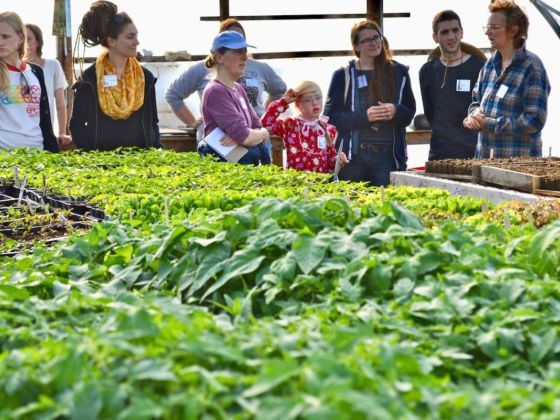Maine’s motto is “dirigo,” or “I lead” — a fitting slogan if you look at the history of the state. Maine was one of the first states to initiate bottle redemption, ban billboards, and is one of the few states implementing a ranked choice voting system. We’re the first to see the sunrise, and we continue to lead the way for many progressive and locavore movements across the country. Here are a few current day movements taking place in Maine that could benefit the entire US.


5 Social Movements Maine Started That Could Benefit the Entire US
1. MOFGA
The Maine Organic Farmers and Gardens Association has certified nearly 500 farms in the state as organic. The organization was founded in the seventies and has since grown to include 11,000 members.
With the help of thousands of volunteers, MOFGA offers trainings and workshops on organic growing practices — advocating for the health of our environment as well as the health of our people with locally produced, pesticide-free foods. Similar associations are hard to find elsewhere in the United States, and none are as long-standing or as established as MOFGA, but the organic trend is spreading — as evidenced at the annual MOFGA-led Common Ground Country Fair.
The unique fair highlights organic crops of Maine, and has since evolved to include alternative energy demonstrations, traditional skills workshops and locally produced artwork, crafts, and music. It brings roughly 50,000 people to Maine every year, who come from all over the country to appreciate one of the most unique fairs around.
2. Offshore Wind
In 2013, Maine became the first state to successfully connect a floating, offshore wind turbine to the grid, harnessing the ocean breeze into the power system. Three years later, the University of Maine Advanced Structures and Composites Center project gained top recognition from the US Department of Energy Advanced Technology Demonstration Program for Offshore Wind, making it eligible for $40 million in construction funding.
The innovative design has pushed the envelope of affordable, renewable energy sources, and put Maine on the map as a leader in such efforts. However, some residents have shown opposition to the project, mainly due to the potential interference of lobstering and fishing sites. Located off Monhegan Island, the project is expected to further develop over the next two years — aiming to become the United State’s first floating, offshore wind farm.
3. Millinocket Marathon & Half
Look out Boston, there’s a new marathon in town. In Millinocket, that is.
The tiny Northern mill-town turned tumbleweed-route has been in the spotlight as of late with their newest tourist attraction — the Millinocket Marathon & Half. Deemed the quickest growing marathon in the states — the race started as a group of friends trying to boost the town’s economy with a grassroots race. Organizers waived registration fees urging runners to put those dollars into local businesses instead.
Since its humble beginnings, the race has turned into an annual favorite, with professional runners from across the country signing up to participate and putting Millinocket back on the map — this time for the scenic race and small-town welcome.
4. Garbage to Garden
The Portland-based Garbage to Garden curbside composting company has gone from serving a handful of households to more than 5,000 across Maine and expanding service into Massachusetts in just six years.
What started out as a grassroots collection system — two roommates and a pickup truck — has turned into one of the leading urban composting systems in the Northeast. The company collects food scraps and various paper from apartments, houses, businesses, and schools that are then brought to a local farm to be turned into compost. Program participants are then left with a clean, green bucket to refill for the following week.
Not only does Garbage to Garden offer a way for city-dwellers to reconnect with the earth, the company also boasts using Maine-made biofuel to wash their buckets, a crucial practice they promote as “removing the ick-factor.”
5. The Telling Room
A speaker on issues of poverty once told her audience to “look at the children” to see a true reflection of the community’s strength.
“Are they playing in parks? Are they well fed and healthy? Are they happy?” she questioned.
In Portland, the answer to each of these questions would be a resounding ‘yes,’ and no place displays that better than at The Telling Room.
The Telling Room is an after-school creative writing hub for youth ages six to 18 that offers a wide range of classes and workshops to feed the imaginations of the students that walk through their doors. Founded in 2004, the program aims to build confidence, leadership, creativity, and fun in the students of Portland and beyond, a whopping 3,500 total.
The Telling Room has been a long-standing favorite in the Maine creative community, but is almost more importantly leading the way for similar philosophies to take root across the country. The program was recently recognized as one of the top twelve after school enrichment programs in the nation by winning the prestigious National Arts and Humanities Youth Program Awards.